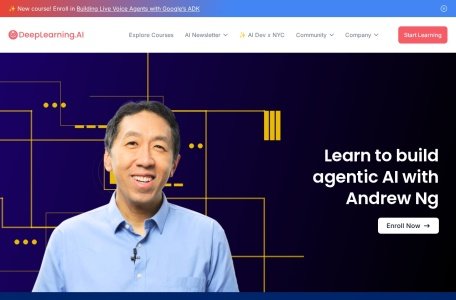
As the “AI talent shortage” has topped industry pain point lists for five consecutive years, countless individuals eager to learn AI systematically find themselves stuck in dilemmas: scattered resources, prohibitively high barriers, and disconnect from real-world practice. However, DeepLearning.AI – founded by leading AI expert Andrew Ng – has built a comprehensive learning ecosystem covering “basic introduction, technical deepening, and industry application,” driven by its mission to “make AI as accessible as electricity” and deep collaborations with top institutions like Stanford University and Hugging Face. By 2025, the platform has attracted 7 million global learners, and its Deep Learning Specialization is widely regarded as the “bible for AI engineers” in the industry. Drawing on course details and real-world cases, this article unpacks the core logic behind its status as an AI education benchmark.
I. Platform Positioning: The “Authoritative Benchmark” of AI Education Backed by Andrew Ng
- Academic Authority: Andrew Ng personally participates in course design, collaborating with prestigious universities like Stanford and the University of Washington to refine content, ensuring the rigor and cutting-edge nature of its knowledge system;
- Industry Practicality: Deep partnerships with companies such as Hugging Face, LangChain, and crewAI mean course cases directly align with industrial needs – e.g., developing private data chatbots with LangChain and deploying open-source models with Hugging Face.
II. Course System: A Three-Tier Structure for All Learning Stages
1. Short Courses: Master Cutting-Edge Skills Quickly
- Post-Training LLMs (in collaboration with the University of Washington): Detailed coverage of techniques like SFT, DPO, and online reinforcement learning, teaching learners to fine-tune general-purpose large models (e.g., GPT-4, Llama 4) for scenario-specific use cases (e.g., customer service chatbots, code generation). An algorithm engineer at an internet company reported: “After completing this course, I directly applied the skills to my company’s intelligent customer service project, increasing model response accuracy by 38%”;
- Multi-AI Agent Systems with crewAI: No complex coding required – design collaborative workflows for multiple AI agents using natural language to automate tasks like market analysis and report generation. Ideal for non-technical roles like product managers and operations to boost efficiency;
- LangChain: Chat with Your Data: Co-developed with LangChain’s founder, this hands-on course teaches learners to build chatbots capable of accessing private data (e.g., Excel, PDFs), solving the “general LLMs cannot process internal data” pain point.
2. Full Courses: Build an AI Cognitive Framework
- Generative AI for Everyone: Using cases like “how generative AI designs advertising copy” and “copyright disputes in AI art,” it explains technical principles and social impacts, helping managers and entrepreneurs develop AI application strategies;
- AI for Everyone: Andrew Ng’s classic course, covering topics from “how AI filters spam” to “ethical dilemmas in autonomous driving,” making core AI logic accessible even to liberal arts majors. By 2025, it has accumulated 120 million views.
3. Specializations: Build Career Competitiveness
- Machine Learning Specialization (in collaboration with Stanford Online): From foundational algorithms like linear and logistic regression to advanced models such as decision trees and random forests, learners implement mathematical principles using Python. Upon completion, they can independently handle tasks like data classification and prediction. A new graduate used this certificate to secure a position in ByteDance’s data department;
- Deep Learning Specialization: The “must-take course” for AI, covering core technologies like CNNs (image recognition), RNNs (time-series analysis), and Transformers (natural language processing). Learners build models using TensorFlow, with projects like “handwritten digit recognition” and “speech emotion analysis” suitable for inclusion in job portfolios;
- Generative AI for Software Developers: Designed for programmers, it teaches using prompt engineering to leverage LLMs for code writing, bug detection, and logic optimization. A backend developer reported: “After mastering the pair programming techniques in this course, my code development efficiency increased by 50%.”
III. Core Advantages: Four Traits Creating Irreplaceable Learning Value
1. Content Authority: Quality Controlled by Andrew Ng
2. Practical Orientation: Projects Aligned with Real Needs
- After completing the Machine Learning Specialization, learners must finish a “housing price prediction” project, analyzing Boston housing data with algorithms and delivering a visualized report;
- Those taking the Deep Learning Specialization complete a “medical image diagnosis” project, using CNN models to identify lesions in lung CT scans.
3. Abundant Free Resources: Lowering Entry Barriers
- Free introductory guides: AI Learning Roadmap, Python Fundamentals Crash Course, etc., to help learners plan their study paths;
- Tool tutorials: TensorFlow Quick Start, Hugging Face Model Deployment Guide, etc., with copy-pasteable code examples;
- Live lectures: Monthly sessions featuring AI experts (e.g., OpenAI engineers, Google DeepMind researchers) sharing cutting-edge insights, with free access to recordings.
4. Global Community Empowerment: Connecting 7 Million Learners
- Q&A Support: When facing code errors or model tuning challenges, posts typically receive answers within 2 hours, with some questions even commented on by industry experts;
- Resource Sharing: Learners voluntarily share “course notes,” “project code,” and “interview experiences,” fostering a mutual-aid ecosystem;
- Networking: Regular online “study groups” and “project collaboration” events help many learners connect with partners or employers.
IV. Application Scenarios: From Personal Growth to Industry Empowerment
1. Personal Career Development
- New Graduates Job Hunting: Specialization certificates and project experience compensate for “lack of work experience.” A computer science student used the Deep Learning Specialization certificate and an “image recognition project” to secure an algorithm position at Baidu;
- Career Transition: Professionals from traditional industries cross into AI. A manufacturing engineer completed the Machine Learning Specialization and transitioned to a data analyst role, increasing their salary by 60%;
- Skill Upgrading: AI practitioners stay updated with new technologies via short courses. An NLP engineer completed Post-Training LLMs and led their company’s large-model fine-tuning project, earning a promotion.
2. Corporate Training
- ByteDance uses the Deep Learning Specialization to train algorithm engineers;
- Tencent uses Generative AI for Software Developers to boost programmer efficiency;
- Traditional industries like banking and healthcare use AI for Everyone to help managers understand technical applications.
3. Industry Implementation
- Natural Language Processing: Learner-developed intelligent customer service chatbots are used in e-commerce and finance, reducing labor costs by 30%;
- Computer Vision: CNN models from courses assist in diagnosing skin diseases and eye conditions in healthcare, improving diagnostic efficiency;
- Data Analysis: Financial institutions use predictive models from courses to optimize credit risk assessment, reducing non-performing loan rates.
V. Learning Guide: Tips for Avoiding Pitfalls and Advancement Paths
1. Efficient Learning Suggestions
- Choose Courses Based on Clear Goals: Beginners start with AI for Everyone; aspiring data analysts select the Machine Learning Specialization; those targeting algorithm engineering focus on the Deep Learning Specialization;
- Learn by Doing, Avoid Procrastination: Dedicate 10–15 hours weekly to specializations, and immediately reproduce projects after completing courses to prevent “forgetting after learning”;
- Leverage Free Resources: Master Python and math fundamentals via free introductory guides before starting paid specializations to reduce learning difficulty.
2. Pitfall Avoidance Reminders
- Don’t Follow Trends Blindly: Short courses focus on cutting-edge technologies, but choose based on job needs to avoid “learning skills you’ll never use”;
- Prioritize Project Practice: Certificates matter, but HR values project experience more. Complete course projects independently – never copy others’ code;
- Engage with the Community: Check past community discussions first when facing issues – most common problems (e.g., TensorFlow environment setup, model tuning) already have solutions.
3. Advancement Directions
- Foundational Reinforcement: After completing specializations, dive into academic papers published by Andrew Ng’s team or read classic books like Deep Learning (by Goodfellow et al.);
- Technical Deepening: For specialized fields like NLP or computer vision, take vertical courses (e.g., Natural Language Processing Specialization);
- Practical Improvement: Participate in Kaggle competitions or GitHub open-source projects to apply course knowledge to real scenarios and accumulate project experience.
Conclusion: The “Competence Passport” for the AI Era
Relevant Navigation


Tuanxiang (Formerly MitataAI)

CheckforAi

AISEO

WaCuoWang

Winston AI

Genspark

Hun Dun Deep Innovation

